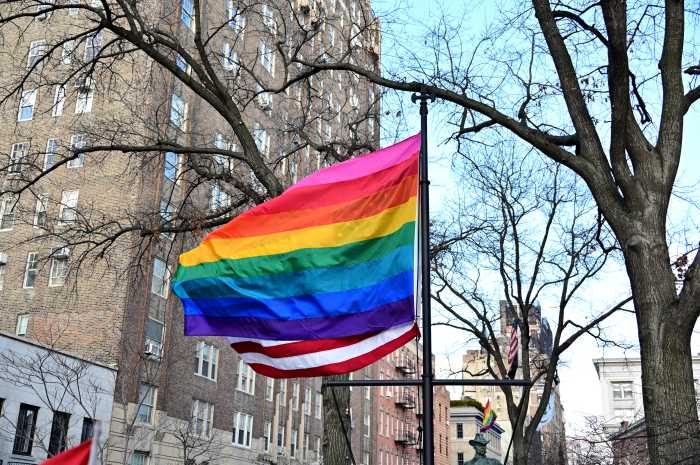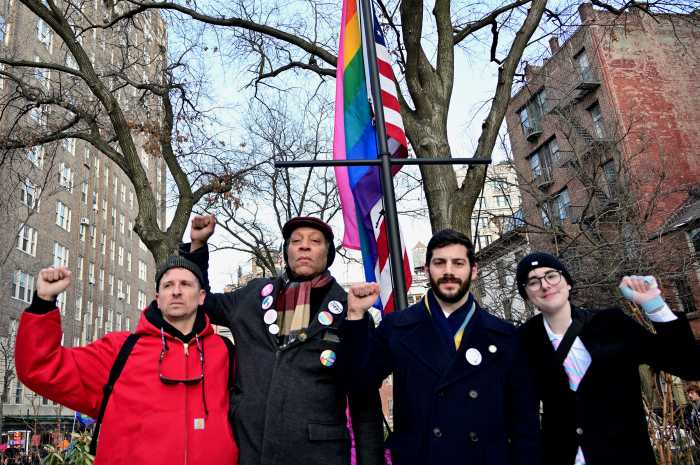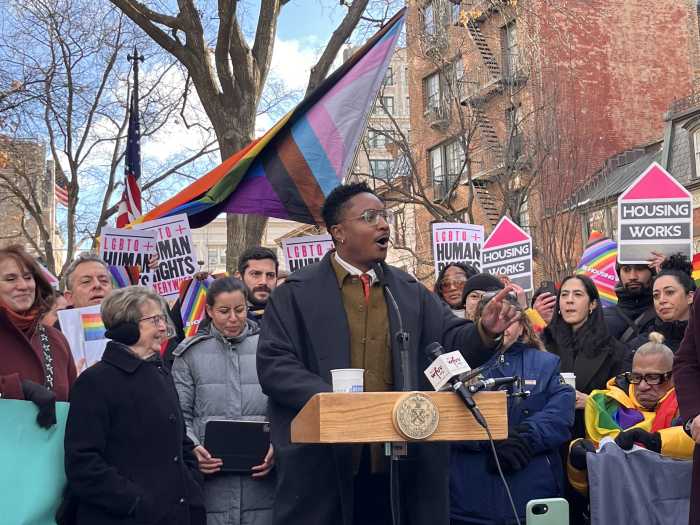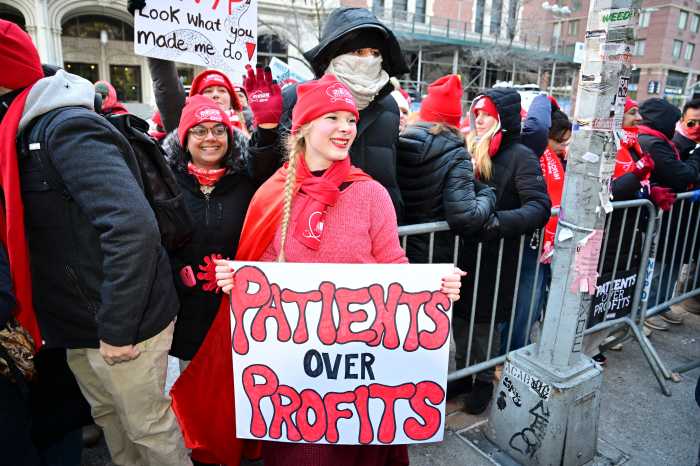VOLUME 3, ISSUE 325 | June 17 – 23, 2004
INTERNATIONAL
Where Pride Is Invisible
Taiwanese Lesbian Activists Talk About a Tall Agenda
In the island republic of Taiwan, the military two years ago issued an official statement saying it would not discriminate against gay servicemembers, a development that the Santa Barbara-based, University of California-affiliated Center for the Study of Sexual Minorities in the Military, suggested was “a bold step for an Asian military force.”
In September 2000, the nation’s president, Chen Shui-bian, who earlier that year was the first elected “opposition” leader in the republic’s half-century history, met with lesbian and gay groups and committed his government to three key rights for queer Taiwanese—to safety, education, and workplace nondiscrimination—as well as a promise of “the president taking the lead to set an example of respect for gays.”
The Chen government (Chinese surnames come first), which won narrow reelection in May, is currently considering legislation that would allow gay and lesbian couples to “found a family and adopt children,” according to reporting by USA Today.
From the cultural vantage point of the gay rights movement in the U.S., all of this would represent heartening progress, even if it falls short of complete equality.
Yet according to four lesbians associated with the Gender/Sexuality Rights Association of Taiwan (G/SRAT), in New York earlier this month, those indicators are illusory, even disingenuous, and the struggle for queer equality on the island has a long way to go.
“Invisibility is a real situation and a quandary,” said Wang Ping, G/SRAT’s founder and secretary general. “A lot has to do with cultural and historical reasons—the family system and how it is central to society.”
According to Wang and her colleagues, the role of families in Taiwanese life poses a fundamental barrier to equality for the lesbian, gay, bisexual, and transgender (LGBT)—it almost universally prevents queer people from coming out in the sense that the term is understood in Western societies.
“Life can be experienced individually but there is still a sense that family face and family name are taken as very strong basic units, as opposed to the way it is in Western cultures,” she explained. “We do have a sense of responsibility for allegiance to family name and family face. The family will still be held responsible for what you do.”
Wang and her colleagues—Ni Chia-Chen, who works on international liaison and youth and HIV issues for G/SRAT; Ding Nai-Fei, a feminist scholar affiliated with the Center for the Study of Sexualities at Taipei’s National Central University and the author of “Obscene Things: Sexual Politics in Jin Ping Mei” (Duke University Press); and Chen Yu-Rong, director of the Internet-based LGBT News Agency in Taiwan—were in New York to accept the annual Felipa de Souza Award from the International Gay and Lesbian Human Rights Commission (IGLHRC). In the awards ceremony held in Manhattan on June 7 and repeated later in the week in San Francisco, IGLHRC praised G/SRAT for being “the primary public voice of the LGBT community in Taiwan for many years.” The four activists sat down with Gay City News on June 8.
Having introduced the issues of family, coming out, and invisibility at the outset of the interview, the four women struggled throughout the session to find the best way to convey in English the specific meaning of these issues in the lives of gay and lesbian Taiwanese, an effort that occasioned extended conversations among Wang and her colleagues in Chinese. Ding did most of the English translation.
Toward the interview’s conclusion, Ding offered further clarification about how families influence gay visibility in Taiwan.
“Coming out is not social. It is typically done just among an intimate circle of family and friends,” she explained. “Parents do not come out with their children. It does not include members of the extended family. A more general social coming out is very rare.”
Ding hastened to add that coming out, at least in the limited way in which she and her colleagues were discussing it, was becoming more common among Taiwanese in their 20s and younger.
The comments by Ding and Wang, taken at face value, are difficult to reconcile with the evolution of public discourse about gay rights in Taiwan. How can the group explain the seeming contradictions?
“In politics, there is a kind of tolerance and progressive rhetoric,” Ding explained, on behalf of the group. “There is a kind of liberation that stops at the door of the family. The attitude is, ‘We can tolerate this in our society.’ But once it is in our family, it brings shame, a kind of marking.”
Thus, in a society in which political discourse at the highest levels reflects gay positivity, the intimate, familial forces in the lives of queer individuals shove in precisely the opposite direction.
The group also pointed to the impact of Taiwan’s underlying political culture in explaining what they described as the LGBT community’s weak standing in society. Pres. Chen’s party, the Democratic Progressive Party (DPP), wandered in the political wilderness through much of Taiwan’s history. Though it grew up with what the lesbian activists termed “progressive roots,” the DPP also had to practice opposition politics in a harsh climate that included for many years martial law.
As a result, Ding explained, there is no tradition of aggressive opposition politics in Taiwan and there is a deep legacy of “apoliticalness, even political apathy.”
“Oppositional politics already creates a stigma,” she said. “For the lesbian and gay community, now there is an additional stigma. That is changing somewhat in the younger generation.”
As with the issue of family, the activists talked back and forth extensively to find an appropriate way to explain the disconnect between political discourse and private lives.
“Political freedom is entirely in the sense of party politics,” Ding said. “This rhetoric of liberation is very much a kind of gesture. Political leaders do not really understand what it needs to do especially in regard to sexuality and gender.”
When pressed on the question of what they believe the government “needs to do,” the lesbian activists cited a wide array of problems facing the queer community and others in Taiwan. Gay men’s bars, sex clubs, gyms, and other gathering places have often been raided by police in recent years. In a number of cases, patrons complained that they faced humiliation, sometimes of a sexual nature, from the authorities. When sexual activity is discovered during such raids, the media present sensationalized accounts that have emphasized the risk of HIV transmission. Early this year, a well-publicized raid on what authorities said was a gay sex party led neighbors of the establishment to disinfect their homes as some reporting suggested that AIDS could be contracted by casual contact. The opportunity to present salacious TV news reports has led some media outlets to send photographers with hidden cameras into gay and lesbian clubs.
Ding, Wang, and their colleagues also talked about the limits on free expression in the Taiwanese media. Though the government does not proactively censor any printed or broadcast materials, all media outlets must register with the government and regulators will inspect any materials about which any citizen comes forward with complaints. Before working with an Internet news service, Chen Yu-Rong was the editor of G & L magazine. On several occasions—once for male nudity, but on other occasions simply for unacceptable text—the magazine was required to recall its print run. The activists also cited the recent example of the government fining a radio program that discussed safe-sex techniques for lesbians .
Censorship also emerges from the streets. Taipei’s lesbian and gay bookstore has repeatedly had its windows broken and inventory vandalized.
Chen explained that constraints on free expression are particularly stringent when it comes to material that children can access. She said that pressure comes into play on sex education materials in schools, and on content on the Internet and on television. Conservative women’s groups, reflecting what the G/SRAT activists termed “state feminism,” demand such information controls in the name of “children’s welfare.”
When it was suggested that much the same kind of pressure exists in the U.S., Chen responded, “The crucial difference from the U.S. is that in the U.S. at least there are protective measures for children. In Taiwan, the concern manifests as a very invasive policy based on the fear of making resources available to children. There is a very active effort to put children into a protective cone.”
The effort on children’s issues reflects a broader anti-sex drive gaining momentum in Taiwanese society, according to G/SRAT. Ding said the movement was based among Christian groups, but also included some Buddhist factions as well.
“The women make use of child welfare rhetoric to further old and regressive conservative forces,” she said.
G/SRAT attempts to counter the conservative forces not only by standing up for gay male sexuality and freedom of speech, but also by advocating on behalf of the rights and welfare of Taiwan’s numerous sex workers. The group also attempts to forge a debate on two issues typically ignored in public dialogue—abortion and artificial insemination. Women can access abortion only in cases of medical need, and even then only with the approval or their husband, or if they are minors, their parents. Artificial insemination, which conservative forces are trying to outlaw altogether, is only available to married women, effectively barring women who live openly as lesbians.
Beyond this array of social problems G/SRAT has on its agenda, the activists have one basic complaint with the current government—even in those areas where the DPP leadership claims progress, the gains are not genuine.
The military is a prime example. Service is compulsory for all men, so in their view the claim that the military does not discriminate against gays is a way of enforcing universal duty. Ding said that gay men dare not come out in the military for fear of harassment and even physical assault. She said her group works with men unwilling to face the potential for abuse by working with psychiatrists to fashion disqualifying excuses for them. Still, such a course has risks.
“Not serving will mark a young man,” Ding said.
But, she added, there are deeper problems with the Taiwanese military than homophobia.
“The military, even up until now, is a holdover from the old regime,” Ding said. “It is the deep bedrock of the conservatism of masculinity. Anti-gay abuse is only a small part of the human rights abuses of the military.”
The G/SRAT activists also dismissed the talk of legislation providing for gay and lesbian families. The language under consideration provides that such families can be formed “in accordance with the law,” but, the activists argued, there is no such law on which such rights can rest.
“It is an empty law,” Ding said.
Similarly, despite the president’s 2000 promise, there has been no action on workplace discrimination and very few queer Taiwanese are out on the job.
The G/SRAT activists suggested that much of the liberation rhetoric is aimed at a foreign audience, particularly in Europe and North America. They seemed to bristle at the suggestion that Taiwan’s military had made strides in equal treatment of its gay soldiers. And, referring to a recent suggestion by Pres. Chen that the family legislation working through the legislature could pave the way for gay marriage, Ding said, “Marriage only comes up with international reporters.”


































